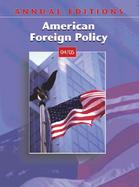American Foreign Policy 04-05
- List Price: $20.93
- Binding: Paperback
- Edition: 10
- Publisher: McGraw-Hill College
- Publish date: 12/01/2003
Description:
UNIT 1. The United States and the World: Strategic Choices1. The Bush Manifesto, Joshua Muravchik, Commentary, December 2002Joshua Muravchik lauds Bush's new national security strategy and chides critics for offering no real alternative. Three elements of the strategy are presented and analyzed: fighting terrorists and tyrants, building good relations among the great powers, and encouraging free and open societies.2. Imperial Temptations, Jack Snyder, The National Interest, Spring 2003Today the United States is seen as facing many of the same strategic dilemmas that faced great powers in the past. Jack Snyder argues that the Bush national security doctrine does not reflect a sober appreciation of the extent to which America's position embodies both omnipotence and vulnerability.3. A Grand Strategy of Transformation, John Lewis Gaddis, Foreign Policy, November/December 2002According to John Gaddis, the ultimate success of Bush's national security strategy rests upon the willingness of the rest of the world to welcome the United States. He analyzes both what this document says and what it leaves out. He concludes that it is too early to judge whether it will work.4. The New Rome Meets the New Barbarians, Joseph Nye, The Economist, March 23, 2002Joseph Nye cautions that the new conventional wisdom that the United States is all-powerful is dangerous because it leads to a foreign policy that combines unilateralism, arrogance, and parochialism. In a global information age, the United States cannot achieve its objectives by acting alone but must be prepared to pursue a multilateral foreign policy.5. The Eagle Has Crash Landed, Immanuel Wallerstein, Foreign Policy, July/August 2002The United States has become the powerless superpower, according to Immanuel Wallerstein. The same economic, political, and military factors that gave rise to American hegemony are now leading to its inevitable decline. The key question today is, Can the United States devise a way to descend gracefully or will it crash-land in a rapid and dangerous fall?6. The Lonely Superpower, Samuel P. Huntington, Foreign Affairs, March/April 1999Samuel Huntington argues that while the world is not unipolar, the United States is acting as if it is. In doing so, the United States is becoming increasingly isolated from other states, and it is taking on the characteristics of a rogue superpower.7. The Five Wars of Globalization, Moiss Nam, Foreign Policy, January/February 2003The national security challenges facing the United States in the coming years extend beyond terrorism. In this article five other pressing problems that demand an American foreign policy response are discussed: the illegal trade in drugs, arms, intellectual property, people, and money. They are all rooted in globalization.UNIT 2. The United States and the World: Regional and Bilateral RelationsPart A. Europe8. The Real Trans-Atlantic Gap, Craig Kennedy and Marshall M. Bouton, Foreign Policy, November/December 2002Much has been made of the gap between the United States and Europe over the conduct of world affairs. This article compares American and European public opinion. It finds similarities in how both groups think about using military force as well as some potentially dangerous differences in outlook.Part B. Asia9. China: Economic Power, Political Enigma, Joshua Kurlantzick, The Washington Quarterly, Summer 2002The author asserts that in order to develop an effective China policy, the Bush administration must recognize that a disconnect exists between China's economic and diplomatic foreign policies. The former has been constructive. The latter has all but ignored the negative global implications of these actions for Asia and the global war against terrorism.10. The Korea Crisis, Victor D. Cha and David C. Kang, Foreign Policy, May/June 2003The authors survey several key issues that must be addressed in constructing a North Korean policy including: Does it belong
Expand description
Product notice
Returnable at the third party seller's discretion and may come without consumable supplements like access codes, CD's, or workbooks.
| Seller | Condition | Comments | Price |
|
Booketeria
|
Very Good |
$3.97
|
|
A2ZBooks
|
Good
|
$10.12
|
|
Ergodebooks
|
Good |
$15.72
|

Please Wait

